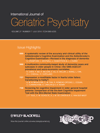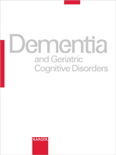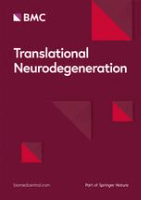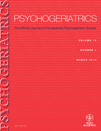
JOURNAL OF ALZHEIMERS DISEASE
Scope & Guideline
Advancing the understanding of Alzheimer's disease.
Introduction
Aims and Scopes
- Neuroscience and Neurobiology of Dementia:
Research focusing on the biological underpinnings of Alzheimer's disease, including neuroinflammation, neurodegeneration, and molecular mechanisms. - Clinical Interventions and Care Strategies:
Studies evaluating non-pharmacological interventions, caregiving approaches, and the effectiveness of various therapeutic strategies in managing dementia. - Psychosocial Aspects and Quality of Life:
Exploring the impact of dementia on patients' and caregivers' quality of life, including social relationships, emotional well-being, and caregiving dynamics. - Cognitive Assessment and Diagnostic Tools:
Development and validation of tools for early diagnosis and monitoring of cognitive decline, including the use of biomarkers and neuroimaging. - Public Health and Epidemiological Studies:
Investigating the prevalence, risk factors, and societal impacts of dementia, particularly in diverse populations. - Innovative Technologies in Dementia Care:
Application of new technologies, such as machine learning and location-tracking devices, to enhance care delivery and patient monitoring.
Trending and Emerging
- Non-Pharmacological Interventions:
There is a notable increase in research exploring non-pharmacological interventions, such as exercise, music therapy, and lifestyle modifications, emphasizing their role in cognitive preservation and quality of life. - Use of Technology in Dementia Research and Care:
The integration of technology, including machine learning for diagnosis and wearable devices for monitoring, is becoming a prominent theme, reflecting advancements in tools that aid both research and patient management. - Stress and Mental Health in Caregivers:
Emerging studies are focusing on the mental health of caregivers, highlighting the need for support systems to mitigate stress and improve overall caregiver well-being. - Neuroinflammation and Immune Response:
Research on the role of neuroinflammation and the immune system in dementia is gaining traction, indicating a shift towards understanding the inflammatory processes underlying cognitive decline. - Gender Differences in Dementia:
There is an increasing emphasis on gender differences in dementia research, particularly regarding the varying impacts of the disease on men and women, and how these differences influence care and treatment strategies.
Declining or Waning
- Traditional Pharmacological Treatments:
Research focusing solely on traditional drug therapies appears to be waning, as there is a growing emphasis on holistic and non-pharmacological approaches to dementia care. - Single-Domain Cognitive Assessments:
The focus on isolated cognitive assessments is decreasing in favor of more comprehensive, multidimensional approaches that consider various factors influencing cognitive health. - Basic Science without Clinical Relevance:
Basic research that does not bridge the gap to clinical applications is seeing reduced interest, with a trend towards studies that directly impact patient care and outcomes. - Cultural Perspectives on Dementia:
While cultural aspects are still relevant, specific studies focusing on niche cultural perspectives appear to be less frequent, possibly due to a broader focus on universal themes in dementia care.
Similar Journals

INTERNATIONAL JOURNAL OF GERIATRIC PSYCHIATRY
Exploring the vital link between aging and mental well-being.International Journal of Geriatric Psychiatry, published by Wiley, stands as a premier journal dedicated to advancing the field of mental health in older adults. With an impressive impact factor reflective of its Q1 categorization in both Geriatrics and Gerontology, as well as Psychiatry and Mental Health, this journal addresses the critical intersection of aging and mental health, providing a platform for impactful research from 1986 through 2024. Researchers and professionals will find the journal invaluable, as it offers comprehensive insights into a range of subjects pertinent to geriatric mental health, with its ranking in Scopus highlighting its academic rigor and relevance (Rank #147/567 in Psychiatry and Mental Health; Rank #37/116 in Geriatrics and Gerontology). Though it operates on a traditional subscription model, the journal's significant contributions to the understanding of psychiatric disorders in the elderly make it a key resource for anyone involved in geriatric care and research.

MOLECULAR NEUROBIOLOGY
Advancing Knowledge in Cellular and Molecular NeuroscienceWelcome to Molecular Neurobiology, the premier journal dedicated to the exploration of the molecular mechanisms underlying nervous system function and pathophysiology. Published by Springer, this journal provides an essential platform for disseminating high-quality research in the rapidly evolving fields of Cellular and Molecular Neuroscience and Neurology, boasting an impressive impact factor that reflects its esteemed position within the academic community. With its ranking in the Q1 and Q2 quartiles for various neuroscience categories, Molecular Neurobiology stands at the forefront of groundbreaking discoveries, showcasing innovative studies that bridge basic science and clinical application. Researchers and professionals are invited to contribute to its rich portfolio, which spans from fundamental insights into cellular processes to advanced therapeutic strategies. Although Molecular Neurobiology does not operate as an Open Access journal, its influential body of work remains accessible through institutional and personal subscriptions. As we converge from 1987 to 2024, we continue to aim for excellence, seeking to catalyze progress in understanding neurological diseases and enhance the scientific dialogue within the neuroscience community.

Dementia and Geriatric Cognitive Disorders Extra
Transforming research into accessible knowledge for all.Dementia and Geriatric Cognitive Disorders Extra, published by KARGER in Switzerland, is an esteemed open-access journal dedicated to advancing research in the fields of cognitive neuroscience, geriatrics, and psychiatry. With a commitment to disseminating high-quality research since its inception in 2011, the journal plays a crucial role in highlighting innovative studies that address cognitive disorders associated with aging. As an open-access platform, it ensures that findings are accessible to a global audience, fostering collaboration and knowledge-sharing among researchers, professionals, and students alike. The journal has been recognized for its impact in Cognitive Neuroscience and Psychiatry and Mental Health, achieving a Q3 category ranking, indicating its reputable standing within these fields. By delivering cutting-edge insights and promoting interdisciplinary approaches, Dementia and Geriatric Cognitive Disorders Extra is instrumental in enhancing understanding and treatment of cognitive decline, making it a vital resource for anyone engaged in the study of aging and cognitive health.

DEMENTIA AND GERIATRIC COGNITIVE DISORDERS
Advancing knowledge in cognitive health for aging minds.DEMENTIA AND GERIATRIC COGNITIVE DISORDERS is a distinguished peer-reviewed journal published by KARGER, based in Switzerland. With a focus on the critical fields of cognitive neuroscience, geriatrics, and psychiatry, this journal is integral to advancing our understanding of cognitive decline and geriatric health. Despite being established from 1990 through 1992 and relaunching its scope in 1994, it has consistently provided a platform for innovative research, as reflected in its strong impact factor and notable Scopus rankings, placing it in the Q2 quartile for disciplines including cognitive neuroscience and geriatric medicine. The journal aims to foster interdisciplinary dialogue and collaboration among researchers, healthcare professionals, and educators, contributing to the growing field of dementia research and elderly care. Open access options further ensure that this vital knowledge is widely accessible, making a significant impact in both academic and clinical settings. With a commitment to quality and relevance, DEMENTIA AND GERIATRIC COGNITIVE DISORDERS remains a key resource for those dedicated to understanding and addressing the challenges posed by cognitive disorders in aging populations.

JPAD-Journal of Prevention of Alzheimers Disease
Shaping Tomorrow’s Solutions Against Alzheimer’sJPAD - Journal of Prevention of Alzheimer’s Disease, published by Springer Basel AG, is a premier academic journal dedicated to advancing research in the critical field of Alzheimer’s disease prevention. Its impactful contributions to the fields of neurology, psychiatry, and mental health have led it to achieve a Q1 ranking in multiple categories, including neurology (clinical) and psychiatry and mental health. Since its inception in 2017, JPAD has become an essential platform for researchers and professionals aiming to stay at the forefront of developments in Alzheimer’s disease research, prevention strategies, and innovative therapies. The journal provides a valuable open access option for disseminating high-quality research to a global audience, enhancing its visibility and impact. With its strategic focus and rigorous peer-review process, JPAD is committed to fostering collaboration and knowledge exchange among scientists, clinicians, and practitioners, ultimately contributing to the global effort to combat Alzheimer's disease.

Translational Neurodegeneration
Empowering Global Collaboration in NeuroscienceTranslational Neurodegeneration, an esteemed journal in the field of neuroscience, is published by BMC and has been an open access platform since 2012, delivering high-quality research from its base in the United Kingdom. With an impressive impact factor reflecting its significant contributions, this journal focuses on critical advancements in cellular and molecular neuroscience, cognitive neuroscience, and clinical neurology, boasting a Q1 ranking across all these categories as of 2023. Researchers and professionals benefit from its extensive reach, characterized by exceptional Scopus rankings that place it in the top percentile of its field. The journal serves as a vital resource for academics and healthcare practitioners alike, aiming to bridge the gap between laboratory discoveries and clinical applications, thereby enhancing understanding and treatment of neurodegenerative diseases. With its commitment to open access, Translational Neurodegeneration ensures that its published research is accessible to a global audience, promoting collaboration and knowledge exchange within the scientific community.

Psychogeriatrics
Empowering professionals with cutting-edge psychogeriatric research.Psychogeriatrics is a leading peer-reviewed journal published by WILEY, dedicated to advancing the understanding of mental health and geriatric psychiatry. With an ISSN of 1346-3500 and an E-ISSN of 1479-8301, this journal has been integral to the field since its inception in 2005 and continues to publish cutting-edge research until 2024. Recognized for its impact, Psychogeriatrics holds a commendable Q2 quartile ranking in Geriatrics and Gerontology, Gerontology, and Psychiatry and Mental Health as of 2023. The journal's Scopus rankings reflect its significant contribution to Nursing Gerontology, Medicine Psychiatry and Mental Health, and Medicine Geriatrics and Gerontology. Although it operates with no open access options, Psychogeriatrics remains a vital resource for researchers, professionals, and students who are exploring the complexities of mental health in older populations. The journal not only disseminates innovative research but also tackles pressing issues related to the psychological well-being of the elderly, making it essential reading for anyone focused on improving geriatric mental health care.

AIMS Neuroscience
Unlocking the mysteries of the brain, one study at a time.AIMS Neuroscience is an esteemed open-access journal published by the American Institute of Mathematical Sciences (AIMS), dedicated to advancing the field of neuroscience since its inception in 2014. With a robust ISSN of 2373-8006 and an E-ISSN of 2373-7972, this journal aims to provide a platform for innovative research and scholarly discourse that spans the diverse and dynamic landscape of the neuroscience discipline. As of 2023, it holds a respectable Q3 category ranking in the miscellaneous neuroscience field and ranks #65 out of 113 in general neuroscience according to Scopus, positioning it in the 42nd percentile for impact. AIMS Neuroscience encompasses a broad scope of topics, from neurobiology and cognitive neuroscience to computational models and neuroengineering, making it a vital resource for researchers, professionals, and students alike. The journal's commitment to open access ensures that cutting-edge research is freely available, fostering collaboration and knowledge sharing within the global neuroscience community.

GERONTOLOGIST
Advancing the Science of AgingThe GERONTOLOGIST, published by Oxford University Press Inc, is a premier journal in the field of geriatrics and gerontology, with a distinguished history since its inception in 1961. This esteemed journal stands out with its impressive Q1 rankings in prominent categories, including Geriatrics and Gerontology, reflecting its vital role in disseminating innovative research and advancing knowledge within these critical disciplines. With an impact factor that ranks it among the top journals in both Nursing Gerontology and Medicine, the GERONTOLOGIST serves as a key resource for researchers, professionals, and students dedicated to enhancing the health and well-being of older adults. Although it operates under a traditional access model, the journal remains committed to publishing cutting-edge studies that address the complexities of aging and inform evidence-based practices. By fostering a rich dialogue among scholars and practitioners, the GERONTOLOGIST is instrumental in shaping the future of gerontological research and policy.

Frontiers in Aging Neuroscience
Fostering Collaboration in the Study of Aging Brains.Frontiers in Aging Neuroscience, published by FRONTIERS MEDIA SA, is a leading open-access journal dedicated to the field of aging neuroscience, with its ISSN being 1663-4365. Since its inception in 2009, this journal has provided a platform for researchers to disseminate their findings on the neurological aspects of aging, addressing critical issues that impact cognition and overall brain health in the elderly population. With a commendable 2023 impact factor, the journal ranks in the Q2 category in both Aging and Cognitive Neuroscience, positioning it among the top-tier publications in these fields. Notably, it is recognized within Scopus, ranking #32 out of 115 in Neuroscience (Cognitive Neuroscience) and #20 out of 38 in the Aging sector, with corresponding percentiles of 72nd and 48th, respectively. As an open-access journal, it promotes unrestricted access to research findings, fostering collaboration and innovation among the academic community. Researchers, professionals, and students alike can explore cutting-edge studies that contribute to understanding the complexities of neurological aging and work towards improving cognitive health in an aging society.